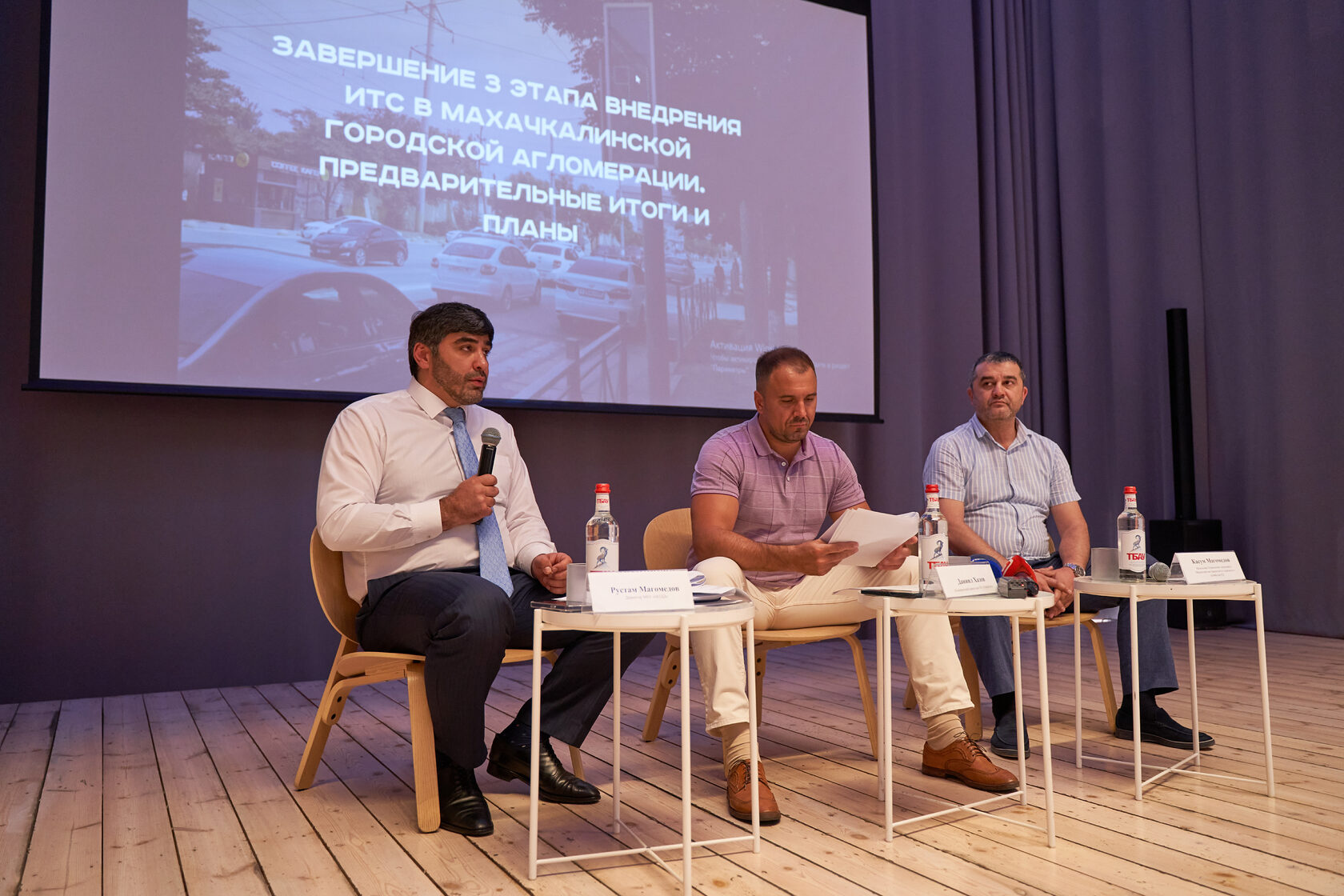A press briefing on ‘Completion of STS Implementation Phase Three in Makhachkala Urban Agglomeration. Interim Outcomes and Plans’ was held on 8 June in Makhachkala.
The event was dedicated to a discussion of matters surrounding the implementation of a smart transport system in Dagestan. The press briefing was attended by Head of the Transport Department Kasum Magomedov, Director of the Traffic Management Center Rustam Magomedov and Urbantech Group’s Chief Commercial Officer Daniil Khazov. The program of STS implementation in the region’s road network is being implemented as part of the ‘General Systemic Development Measures for Roads’ federal project and ‘SafeHigh-Quality Roads’ national project.
Project goals are to improve the road traffic efficiency and throughput capacity, reduce the length of traffic jams and travel time, improve traffic safety.
The round table participants started the dialog with a discussion of the outcomes of STS implementation in Dagestan.
Project goals are to improve the road traffic efficiency and throughput capacity, reduce the length of traffic jams and travel time, improve traffic safety.
The round table participants started the dialog with a discussion of the outcomes of STS implementation in Dagestan.
“Since the start of the STS implementation in the Makhachkala Urban Agglomeration in November 2021, visible results have taken shape. Thanks to the implementation of the traffic management project, street throughput capacity has grown by 15% while the number of traffic congestions reduced by 14%, and the capacity of downtown arteries improved by 12%,” announced Kasum Magomedov, Head of the Transport Department.
During the discussion, Director of the Traffic Management Center Rustam Magomedov gave an account of existing issues that obstructed the STS implementation in Dagestan.
“First, the number of vehicles in Makhachkala considerably exceeds the road network capacity. In 2021, the new vehicle market in Dagestan grew at least by 150–200%. Second, the obsolete traffic management practices and pop-up parkings around the city result in high traffic accident rates. Third, Makhachkala has encountered a logistical problem: one of the city’s key districts is effectively divided in two by a railway with only two crossings,” noted Rustam Magomedov.
To resolve the issues faced by the Republic, the Traffic Management Center has been launched that allows to monitor street traffic loads in real time, respond promptly to traffic accidents, oversee the public transport service quality, manage traffic at street crossings and in the busiest traffic areas. TMC operators use traffic detector data to calculate traffic lights switching patterns; as they monitor video streams from cameras, they detect potential accodent factors, while TMC’s public transport monitoring system allows the operators to control the number of trolleybuses in operation and identify potential traffic violations.
“During the third stage of STS implementation, 12 traffic lights units were upgraded, 54 traffic detectors and 26 video cameras were installed in the city’s busiest arteries. Additional traffic lights units (84 in-road ones and pedestrian ones) were installed. In Makhachkala, the STS coverage area extends onto the Peter the First, Akushinskogo, Gamidova, Rasula Gamzatova Avenues, the Yaragskogo and Korkmasova Streets. Many in the city community are positive about the outcomes of the smart transport system implementation, especially about the “green wave” mode of traffic lights operation,” Urbantech’s CCO Daniil Khazov underscored.

Importantly, the effect from STS implementation will only be visible if a holistic approach to the transport problem solution is followed. The smart transport system will reach maximum efficiency, making traveling around the city more comfortable and saving travel time, only if it is dexterously used by experienced specialists and enjoys continuous support.
Furhermore, the effectiveness of STS implementation is estimated using the STS digital maturity methodology, approved by the Russian Ministry of Transport. In particular, to achieve the first level of maturity, Dagestan has to retrofit and connect to the TMC at least six adaptively controlled traffic lights, install traffic detectors at 17 traffic lights units connected to the TMC, install a total of 81 traffic detectors at city-level traffic arteries, upgrade the hardware and software at TMC and the Public Transport Monitoring and Control Center, and the take action to develop an integration platform for the implementation of new STS components.
Source: Urbantech Group’s press service
Furhermore, the effectiveness of STS implementation is estimated using the STS digital maturity methodology, approved by the Russian Ministry of Transport. In particular, to achieve the first level of maturity, Dagestan has to retrofit and connect to the TMC at least six adaptively controlled traffic lights, install traffic detectors at 17 traffic lights units connected to the TMC, install a total of 81 traffic detectors at city-level traffic arteries, upgrade the hardware and software at TMC and the Public Transport Monitoring and Control Center, and the take action to develop an integration platform for the implementation of new STS components.
Source: Urbantech Group’s press service
